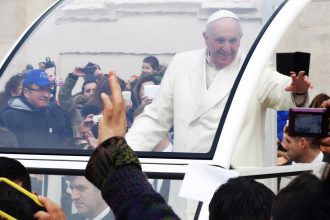Miklós Soltész: Hungary Sets an Example for Helping Persecuted Christians

Hungary sets an example for the more affluent countries when it comes to helping persecuted Christians, said Miklós Soltész, Secretary of State for Churches, Minorities and Civil Affairs. He was speaking from the Prime Minister’s Office at a conference entitled: “The security situation of religious communities in a changing world”, that was held in Budapest on Monday.
The Hungarian government supports the idea of the conservation and strengthening of local Christian communities.
For the past three years, Hungary has opposed the invasion of its own borders by immigrants. Because of this, many people talk of the Hungarian Prime Minister and indeed the Hungarian political leadership as the saviours of Europe.
According to State Secretary Mr. Soltész, the question is whether those who have become rich from trading arms and causing wars will finally realise their responsibility to bring help to the war-torn areas.
The State Secretary emphasised that while supporters of global migration were trying to remedy the labour shortage of rich European countries and thus further weakening Middle Eastern countries, the Hungarian government was supporting the conservation and strengthening of primarily local Christian communities in the Middle East.
This is the objective of the church and school building programmes led by Hungary. These programmes are similar to the scholarship programme through which hundreds of young Middle Eastern students can study at Hungarian universities thus enabling them to return home and help their countries with the knowledge they have acquired – he added.
Mr Soltész also noted that three years ago about half a million people marched through Hungary, and “despite all the lies”, the government did, in fact, help the needy so that nobody would suffer from the lack of food or medical help. At the same time:
“We did not assist those who invaded our borders,” he remarked.
“Two and a half years ago, the Hungarian political leadership and the Hungarian Prime Minister were badly criticized for the construction of the border-fence but now they are considered to be the saviours of Europe.
Italy, Austria ‘followed us’ and on Sunday, German Chancellor Angela Merkel said: ‘the Hungarian fence also protects Germany’. It’s a pity she did not acknowledge this two and a half years ago” – the Secretary of State noted.
Miklós Soltész also pointed out that the Deputy State Secretariat for the Aid of Persecuted Christians will continue to work under the Prime Minister’s Office and on his own behalf.
Gyorgyi Nyikos Vice-Rector for International Affairs of the National University of Public Service (NUPS) who is organising the conference, said that a research group studying the security situation of religious communities is operating from the university.
Internationally recognised researchers and their PhD students are working together to draw attention to the situation of Christian communities in the Middle East. They also work in partnership with the government and the Christian communities of the Middle East.
Zsolt Marton Rector of the Central Theological Seminary, which was home to the conference, recalled the time of the Turkish occupation when there was a mosque in the place of the university church and how the Pauline monks went over there to pray right after the expulsion of the Turks. The Paulines built a monastery next to the mosque but when they finally finished it, Joseph II abolished their order in 1786. In the empty monastery, Joseph II wanted to establish a Josephinist seminary but he could not find a sufficient number of educators. Finally, in 1805 the Theologist Seminary Institute started operations- he said.
Later, some of the many storms of history swept through the institution. In 1848, for instance, Parliament held its sessions in the university church. About a century later, the treasury of the Red Army was held in the seminary. These storms have now passed and we are here “to serve the Hungarian nation” the head of the institution stated. Among others, Pierbattista Pizzaballa, the Archbishop of Jerusalem gave a lecture during the whole-day-long conference. The chief patron of the conference is Péter Erdő Cardinal, Archbishop of Esztergom-Budapest, Primate of Hungary.
Source: MTI/S4C



